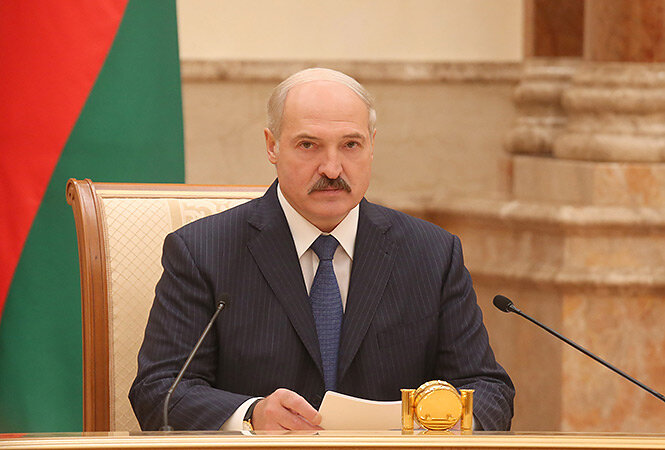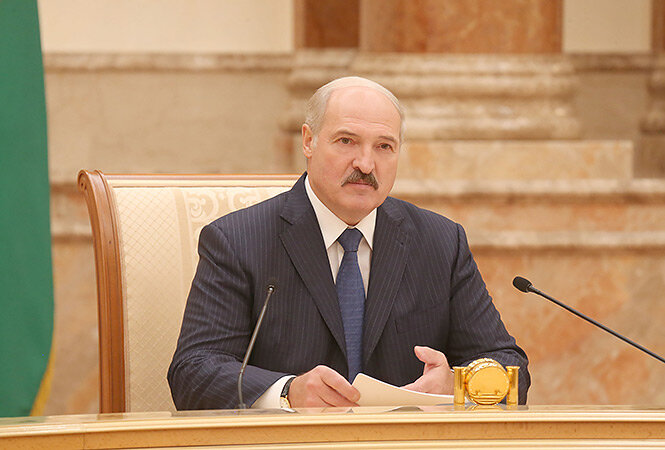Aleksandr Lukashenko meets with creative intellectuals
- 1
President of the Republic of Belarus Aleksandr Lukashenko wants Belarusian writers to create ideas, characters and books that will be interesting for the people in the 21st century. He made the statement at a meeting with creative intellectuals on 23 October.
“I wonder why we have not seen the books like ‘War and Peace’, ‘Virgin Soil Upturned’ in the past 20-30 years. Does it mean the lack of talents? Or is this due to the objective life conditions when a book stops to be the main source of information?” the head of state asked.
Aleksandr Lukashenko believes that changes in the readers’ mind should not be explained by the technological revolution only. In his opinion, the dramatic pace of life developed a pragmatic attitude to literature. “Our contemporary readers choose books with fascinating themes and characters or books which are a remedy against boredom. Serious literature turns into reading for intellectuals,” the President remarked.
The head of state suggested discussing the role of readers, books and writers in literature. The President emphasized that the meeting brought together interesting, extraordinary people who can discuss not only the current state of Belarusian literature, but also the spirituality, culture and historical choice of Belarus.
“Scientists say that economic, political, military advantages of the state do not exist on their own. They are always part and parcel of its spirituality and culture. The development of the society, life of the nation must rely on the everlasting trine: science, education and culture,” the head of state noted and invited participants of the meeting to discuss the role of fiction in this process.
“I would like to hear your ideas about how we can preserve and enhance the literature traditions today without disappointing a major part of readers. Is it possible for readers to find an interesting book and for writers to find their readers?” the President said.
Aleksandr Lukashenko said that he does not believe that the Belarusian literature has plunged into the twilight.
“Throughout the history of our nation, literature has always been the means of learning about the world and educating a personality. For a reason the poetry and prose of Kupala and Kolas, Bogdanovich and Melezh, Korotkevich and Bykov are a source of national pride for many generations of Belarusians,” the head of state noted.
“Why does the contemporary Belarusian literature fall short of the highest standards set by our great writers?” the President asked addressing the attendees. “Maybe, the inertia of mind hampers venerable writers, while the younger generation lacks worldly wisdom and experience? Or is it because the time has changed and our literature is just following global trends losing the national identity?” Aleksandr Lukashenko wondered.
The President drew attention to the fact that literature has always been the source of ideas and themes for other types of art. The head of state asked how this artistic partnership is developing now. “Writers complain that contemporary composers and directors have turned their back on the national literature. Are their complaints fair? Maybe, the reason for the waning interest is the lack of good books?” the head of state said.

Speaking about writers, Aleksandr Lukashenko said that there are no great literature works despite the fact that nothing impedes the freedom of writers to create anything they want.
The President reminded that in the time of the Soviet Union creative intellectuals often complained about censorship and the rigidity of socialist realism. “However, it was in those years that literature earned the highest level of respect for itself. Yevgeny Yevtushenko once described writers as people infused with the proud spirit of citizenship, who shun comfort and rest,” the head of state said.
“Although when I watch some movies or read works by great writers, artists and other people of your kind, I am surprised by their statements that they were allegedly oppressed during the Soviet times and could not work properly,” the President said. “However, all of them received titles of people’s writers. All of them lived excellent lives back then. Therefore, I can say that complaining is trendy today. Just as well,” he added.
“In our days nobody dictates what and how you should write. If someone does, then tell me about it. Censorship and state monopoly on printed word are a thing of the past. If it is not so, tell me about it as well,” the head of state told the writers.
“However, this freedom has not led to the emergence of great literature. Instead it has split the writing community. Is it a dead end? Or do you have hope for the restoration of the common creative field?” the President remarked.
Aleksandr Lukashenko pointed out that not only writers, but cultural workers, who are in any way related to literature, are invited to participate in today’s dialogue.
The writers told the President about the issues that concerned them most. They discussed modern trends in literature and pointed to the waning interest in books in the entire world, not only in Belarus. They said that at present literature is going through hard times.
When asked why domestic authors and their works are so poorly advertised, the President said: “Tell me, what should be advertised? Give us products that can be advertised and we will find money to do that,” he noted.
The President demands that the public funds spent on supporting intellectuals should yield results. In particular, he drew attention to the fact that the government invests in the promotion of cinema. “This has not yielded any results yet. And this is people’s money,” Aleksandr Lukashenko said.
The government wants writers to help promote citizenship and patriotism. Money does not always play a major role here. The most important thing is talent. Participants of the meeting gave examples of people who had nothing to do with art, but who managed to write very popular books without big investments.

The discussion about literature gradually gave way to discussion about education. The attendees discussed the literature that is now included in school curricular and shared their thoughts on whether these curricular feature enough Belarusian authors. The participants of the meeting believe that more should be done to promote the Belarusian language inside the country and abroad. A suggestion was voiced to consider establishing a national university where all disciplines would be taught in the Belarusian language.
The attendees also discussed the work of publishing houses. They deem it necessary to study readers’ preferences and interests more carefully. They also suggested using a competitive approach to publishing books if the publication is subsidized by the government.
Aleksandr Lukashenko noted that publishing houses that violate the law will be shut down.
“The government will act within the law and in line with moral principles of the society. I always ask civil servants to be honest and fair. If some publishing houses do not respect these principles, they will be shut down. It is my position. If a minister does not do it and I find out that he does not do it because of some opportunistic reasons, he will be fired the next day,” Aleksandr Lukashenko said.
Aleksandr Lukashenko noted that there is a lot of brutality and violence in movies and books now. Most of readers and viewers are already sick and tired of that. He believes that television and cinema lack popular works that would tell a story about the life of ordinary people.
The participants of the meeting suggested instituting a large-scale literature contest.
The President upheld this idea and noted that the selection criteria should be developed by writers on their own. Aleksandr Lukashenko suggested conducting such a contest in 2014 and promised to attend its final part when the results of the competition are announced.
